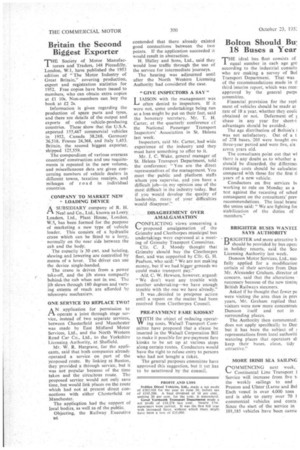ONE SERVICE TO REPLACE TWO?
Page 40

If you've noticed an error in this article please click here to report it so we can fix it.
AN application for permission to operate a joint through stage service, instead of two separate services, between Chesterfield and Manchester was made by East Midland Motor Services, Ltd., and the North Western Road Car Co., Ltd., to the Yorkshire Licensing Authority, at Sheffield.
Mr. W. R. Hargrave, for the applicants, said that both companies already operated a service on part of the proposed route. By linking at Buxton, they provided a through service, but it was not popular because of the time taken and the circuitous route. The proposed service would not only save time, but would link places on the route which had not at present direct connections with either Chesterfield or Manchester.
The application had the support of
focal bodies, as well as of the public, Objecting, the Railway Executive -136
contended that there already existed good connections between the two points. If the application succeeded it would result in abstraction.
H. HbIley and Sons, Ltd., said they would lose traffic through the use of the service for intermediate journeys. The hearing was adjourned until after the North Western Licensing Authority had considered the case. "GIVE INSPECTORS A SAY"
LIAISON with the management was 1-1 often denied to inspectors. If it were not, some undertakings being run at a loss might be put on their feet, said the honorary secretary, Mr. T. H. Carter, at the quarterly conference cf the National Passenger Transport Inspectors' Association in St. Helens last week,
Inspectors, said Mr. Carter, had wide experience of the industry and they must have something to offer to it.
Mr. I. C. Wake, general manager of St. Helens Transport Department, told-. the conference: " You are the direct representatives of the management. You meet the. public and platform staffs whom you supervise, and you have a difficult job—in my opinion one of the most diffiault in the industry today. But if you would developthe quality of leadership, many of your difficulties would disappear."




































































































